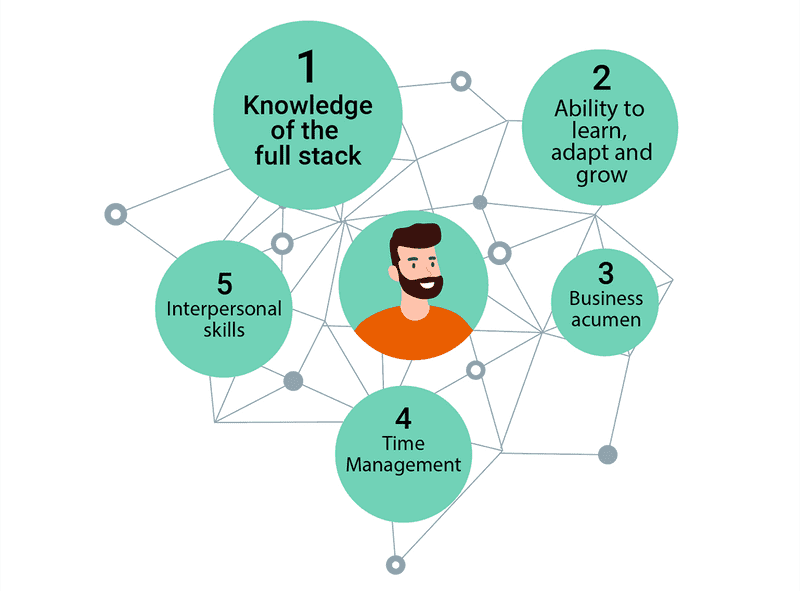One of the biggest myths about software engineers is that all they need to know is how to write great code. But, a quick look at questions asked at software engineering job interviews shows that employers look way beyond candidates that are simply great programmers. Software engineering jobs today demand a variety of skills that combine coding with non-programming skills, practices, habits, and knowledge.
High-performing software engineers have a number of characteristics in common. We look at five qualities likely to make a software engineer a high performer.
Here are the top five qualities that all successful software engineers should possess.
1. Knowledge of the full stack
It goes without saying that any good software engineer or good software developer needs technical knowledge and technical skills. Not only is the software engineering scene constantly and rapidly changing with new advancements, but it’s also incredibly competitive—in spite of the fact that there are nearly not enough software engineers to meet the ever-growing demand.
To stand out in such a market, being a full-stack programmer helps (more on full stack developer skills here). If that makes you worry that you are expected to know every single programming language in the world, don’t fret. Full-stack doesn’t mean “everything.” It simply means “end-to-end.”
Related Read: Full Stack Developer Resume: 8 Examples to Get You Hired
A software product is made of several layers—front-end, back-end, server, hardware, network, and database. An excellent software engineer would not only be knowledgeable about the functionality of each stack, they would also have the ability to jump in and independently solve problems in any phase of application development when needed.
This is important because a software engineer’s job is not to make code work in isolation, but to make the software work on the whole.
2. Ability to learn, adapt and grow
A LinkedIn survey showed that programmers spend more time learning than any other professional—48% of software engineers learned a new skill recently, compared to 36% among all professionals. Continuous improvement is not just a good practice for the software, it’s great for the engineer too. Some of the key sources of learning for software engineers are:
- On-the-job learning with GitHub, StackOverflow, etc. This is the staple of every software engineer. Identifying defective code and finding solutions online is, in fact, the bare minimum.
- Upskilling programs or bootcamps. If you’re looking to learn a specific skill such as data science or artificial intelligence, online bootcamps can be a great option. For instance, with a program like Springboard’s Data Science Career Track, you can learn without having to quit your job, pay much less than a traditional university program, and get skills up-to-date for current market needs.
- Seminars and conferences. The latest developments in any field are often presented and debated at industry events. Identifying ones that are most relevant and participating in them regularly helps you stay ahead of the curve.
- Mentorships and coaching. In spite of how motivated you are, there is a limit to how much you can learn on your own. A good mentor can help you see clearer and accelerate your future in software engineering.

3. Business acumen
While you don’t have to have an MBA to be a good software engineer, you can’t be oblivious to the business context. Knowing your software as it functions in the real world is a key skill for software engineers. And good programmers spend a significant part of their careers developing their business acumen by:
- Understanding the end-user personas clearly
- Collaborating closely with the business teams
- Collecting and working on user feedback
- Studying usage analytics and other performance metrics
In fact, senior software engineers and leaders also take interest in marketing, sales, and revenue metrics of the software to gauge the overall value of their work.
4. Time management
To cram so much action into every single working day, a software engineer must be a master at managing their time. There are various tools and techniques programmers use to manage time and split up the long hours. Some common ones are:
- Pomodoro timers and website blocking apps to stop distractions
- Time-tracking to measure productivity
- Clear goal-setting—from daily and weekly to yearly and beyond
- Regular reviews to track progress
Get To Know Other Software Engineering Students
Jason McGinty
Full-stack Systems Engineer at Technicity
Kristy Chu
Software Engineer at FloQast
Promise Morka
Software Engineer at AECOM
5. Interpersonal skills
Hired’s 2020 State of Software Engineers study shows that nearly half of the software engineers would rather come into an office every day. Software engineers are viewed as isolated professionals who work better alone. But in reality, they’re an active part of the ecosystem involving many stakeholders, business teams, and end-users.
The ability to meaningfully collaborate is a key quality that differentiates good developers from the best developers. Robert Half’s Salary Guide notes that as every piece of software development and maintenance edges closer and closer to complete automation, software engineers must spend the majority of their time strategizing and working with other stakeholders. Great software engineers know this; that’s why they prioritize improving their soft skills along with their technical knowledge. Great developers are team players with good communication skills, a positive attitude, and a good grasp of the collaborative process that goes behind the building of a product.
Key interpersonal skills that a software engineer needs:
- Collaboration skills. You must be able to effortlessly collaborate with various team members across cultures and backgrounds.
- Communication skills. You must know how to communicate, clarify, explain, and persuade.
- Empathy skills. You must understand the needs of the user and how the software addresses them.
- Critical thinking skills. Software engineering is nothing if not a bundle of problems waiting to be solved. Software engineers need to critically analyze situations and solve problems.
- Leadership skills. New software, by its very nature, brings about change in the way things are done. This needs you to lead from the front. Leadership is an important skill possessed by the very best programmers.
To sum up, great software engineers not only enjoy building cool things, they also know to pick apart well-built things that work well so that they can learn and improve. They’re enthusiastic collaborators who know how to communicate effectively. Buggy code doesn’t defeat them; in fact, it drives them to perform better.
What makes a good software engineer is not merely writing code—but building products and delivering value to users’ needs.
Since you’re here…
Interested in a career in software engineering? Join our mentor-led Software Engineering Bootcamp or our foundational Software Engineering Course if you’re just starting out. We help people make the switch every day (just peep our reviews). You can do it, too!






